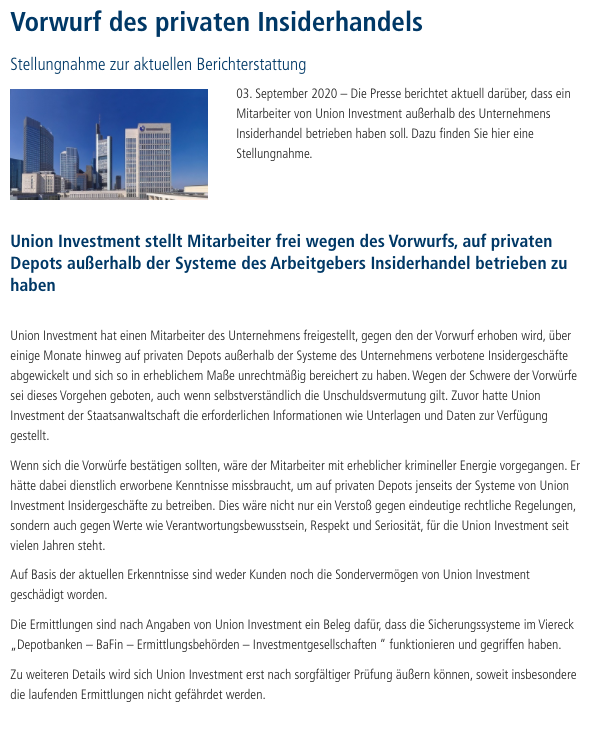Following the meltdown of the German FinTech darling Wirecard another scandal is rattling the financial and political world in the EU’s largest economy. Talk of market abuse at a leading investment fund is making the rounds and we look at what is behind the accusations, what went wrong and how to avoid such a crisis.
Yesterday, the news broke that a prominent fund manager of one of Germany’s biggest fund houses had been taken into custody on the suspicion of insider trading. Union Investment, the investment arm of the DZ Bank Group and part of the cooperative financial services network, reported more than €368bn of assets under management at the end of last year. When rumors started to circulate about a potential case of market abuse, the financial firm suspended its employee internally following the claims that the fund manager had used his position to make about €9m from inside information.
What happened?
Last week, media reports appeared that claimed a top fund manager at Union Investment had been suspended for potential insider trading, a form of market abuse. Shortly after, the company released a statement wherein it says that “Union Investment has released an employee of the company against whom the allegation is made of having carried out prohibited insider trading in private custody accounts outside the company’s systems for several months, thereby illegally enriching himself to a considerable extent. Because of the seriousness of the allegations, this procedure is advisable, even if the presumption of innocence naturally applies. Union Investment had previously provided the public prosecutor with the necessary information such as documents and data. If the allegations were to be confirmed, the employee would have acted with considerable criminal energy. He would have misused business knowledge to engage in insider trading in private custody accounts beyond Union Investment’s systems. This would not only be a violation of clear legal regulations, but also of values such as a sense of responsibility, respect and seriousness that Union Investment has stood for for many years. Based on current knowledge, neither customers nor Union Investment’s funds have been harmed.

Since then the company has declined to comment further saying that Union Investment will only be able to comment on further details after careful examination, provided that the ongoing investigations are not endangered.
What’s Market Abuse and Insider Trading
To fully understand the accusations and the potential consequences, it is important though to understand the essentials of the regulatory framework. Market abuse is according to the rules established by the Market Abuse Regulation (“MAR”)of the European Union “a concept that encompasses unlawful behaviour in the financial markets”. The lawmakers stressed that such behaviour prevents full and proper market transparency, which is a prerequisite for trading for all economic actors in integrated financial markets.
While there are differences across jurisdictions with a view to the exact details of rules regarding market abuse, there are basically two kinds of behaviour that is considered market abuse, namely insider dealing or market manipulation. It is the first kind of behaviour that is relevant in this case. Insider dealing can be defined as where a person has information that is not publicly available and makes use of such information for a personal gain.
Inside information is the key element of any kind of market abuse behaviour and for information to qualify as inside information it has to be
- precise information;
- not generally available;
- information a reasonable investor would use to make an investment decision; and
- information, that if generally available, would likely have a significant impact on the price of an investment.
Only if these four elements are on hand, is the information considered inside information for the purpose of the market abuse rules.
The Accusations and Potential Consequences
While there is limited information available so far regarding the exact nature of the wrongdoings, word is that the accused fund manager used the inside information he had in the form of upcoming trades for personal dealing. The deals of a large asset manager are likely to impact the prize of a security and by trading in this knowledge before these dealings he was frontrunning the price movement. Despite the long experience of the suspect, the dealings were hardly disguised and set off several alarm bells. The brokers executing the deals for the accused reported the suspicious activity to BaFin, the German financial regulator, who in turn passed the information immediately to the public prosecutor.
Obviously, it is too early to speculate about the personal consequences for the suspect, but misconduct on such a scale is comparable to other high-profile cases like those of Rajat Gupta or David Einhorn.
The trouble does not end at the personal level though: Union Investment will have to answer questions how it was possible that one of its senior fund managers could use his position, especially if the full scale of the operation is discovered and it turns out that this activity has happened for a prolonged period. The asset management firm therefore will come under scrutiny, in particular with a view to its procedures and controls. For example, was the person in question only subject to voluntary declarations about his personal account dealings? If so, should the company have insisted on additional measures like access to the fund manager’s tax returns? The investigation will possibly shine more light on the specifics but it is difficult to imagine that it will not also stop at the bad press and damage to the reputation of the financial firm, but don’t expect anything to that extent any time soon.
In any case, following the already the destructive news of the Wirecard story to the financial industry in Germany, unfortunately this second episode erodes much needed trust in the sector even further. Sounds like turbulent times ahead.

